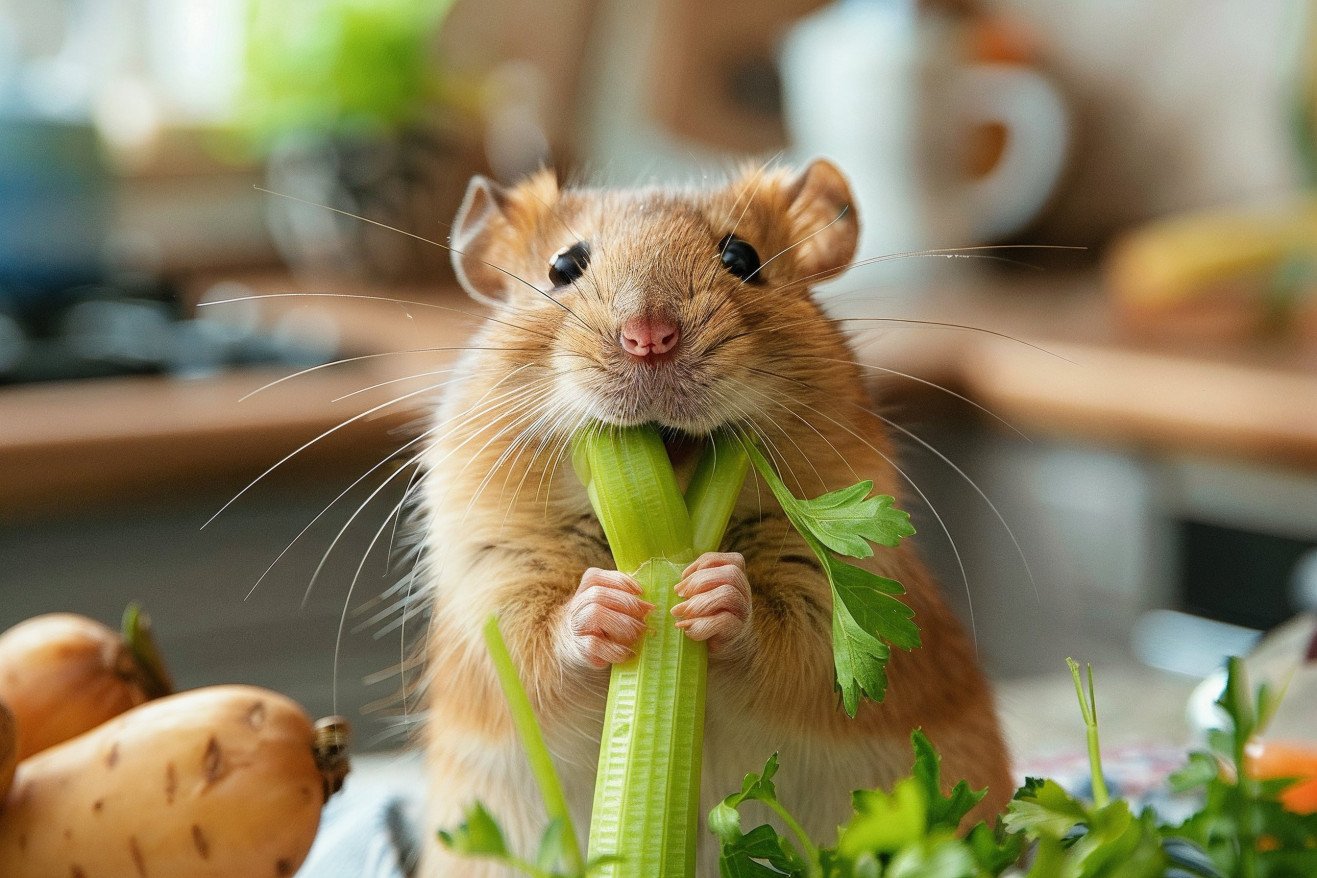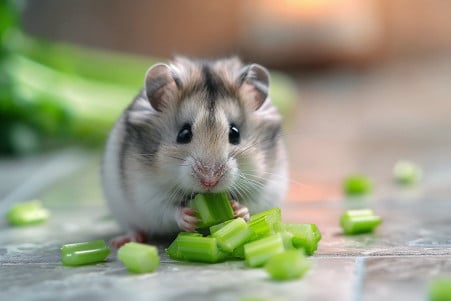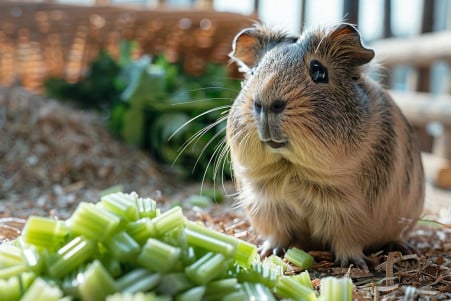Can Rats Eat Celery? A Closer Look at Their Dietary Needs
20 April 2024 • Updated 19 April 2024

Can your pet rat munch on celery as a healthy snack, or should this crunchy vegetable be off the menu? Rats can eat celery in moderation as part of a balanced diet. Celery is low in calories but high in fiber, vitamin K, and antioxidants that are beneficial for rats. However, the stringy fibers can cause digestive issues if overfed, so celery should only make up a small portion of a rat's fresh vegetable intake.
While celery alone won't cause any immediate harm, it's vital to explore the nutritional dos and don'ts that ensure our furry friends maintain optimal health. Through a closer examination of veterinary research and expert advice, we'll guide you on appropriately incorporating celery and other fresh foods into your rat's diet. Understanding their dietary needs thoroughly safeguards their wellbeing and allows them to thrive.
Can rats eat celery?
Risks and Symptoms of Celery Toxicity in Rats
Celery is generally safe for rats, but there are some risks associated with overconsumption. According to Mom.com, many rat owners don’t feed celery to their pets because it has little nutritional value. Overeating celery can also cause digestive problems, such as diarrhea or gas, because it’s high in fiber. While Squeakin' Pups includes celery on its list of safe foods for rats, it suggests feeding them no more than an inch of the stalk per day.
Celery can also cause allergies in rats, including anaphylaxis, which can be fatal. Medical News Today notes that celery is one of several foods that can cause a severe allergic reaction in people, with symptoms like hives, swelling, and difficulty breathing that require immediate medical attention. Celery is also one of the foods most likely to contain pesticide residues, so it’s important to wash it thoroughly before feeding it to rats.
Symptoms of celery toxicity in rats include vomiting, weakness, loss of appetite, and abdominal pain. While the risks are low if celery is fed in moderation, it’s important to watch for signs of an allergic reaction. It’s also important to wash celery thoroughly and feed it in small amounts to avoid toxicity. If you do this, you can safely feed this crunchy vegetable to your rat. And because it may offer some health benefits, it can be a good occasional addition to your pet’s diet.
Nutritional Facts of Celery for Rats
Celery is low in calories and fat, but it does have some nutritional value for rats. Per PetHelpful, celery is a good source of fiber, which can help with digestion and gut health. It also has antioxidants and vitamin K, which can help with overall health and immunity. Plus, celery has a high water content, which can help keep rats hydrated, according to the Brisbane Bird & Exotics Veterinary Service.
That said, Woodgreen Pets Charity warns that celery is not nutritionally complete and should not be a regular part of a rat's diet. Instead, it's better to offer celery as part of a balanced and diverse diet to make sure rats get all the vitamins, minerals, and macronutrients they need to stay healthy.
How Much Celery Should You Feed Your Rat?
You should only feed your rat 1-2 small pieces of celery at a time, 1-2 times a week. Pet Keen notes that this is about the size of the rat's ear. It's important to stick to these serving sizes because rats can overeat and end up with digestive problems.
FOUR PAWS Australia says that celery should be an occasional treat, not a regular part of a rat's diet. The Evolution Rattery also says that you should watch how your rat reacts to celery and adjust the serving size as needed to avoid issues with the high water content.
How to Prepare and Feed Celery to Rats
Make sure to wash celery thoroughly to remove any pesticide residues before giving it to rats. Per Isamu Rats, it's important to provide a variety of fresh fruits and vegetables to rats, and celery is a high-fiber, high-water content vegetable that should be fed sparingly.
Cut or break celery into small pieces to make it easier for rats to eat. The RSPCA Knowledgebase suggests giving rats small amounts of fresh dark leafy greens and non-starchy vegetables as part of their daily diet.
Try feeding celery with other nutrient-rich vegetables to ensure a well-rounded diet. wikiHow suggests that good vegetables for rats include broccoli, cabbage, carrots, and parsley, as well as celery.
Feed celery as a supplement or snack, not a main part of a rat's diet. Watch how rats respond to celery and adjust the amount you give them as needed to prevent potential stomach upset from the high fiber and water content.
Conclusion: How to Integrate Celery Into a Healthy Rat Diet
Celery is safe for rats to eat, whether raw or cooked. It is low in calories and high in fiber, so it can be a good option for rats that are overweight. It also contains antioxidants that can support a number of different aspects of your pet rats' health. Per PetPad, celery is 95% water and is made up of carbohydrates, as well as soluble and insoluble fibers. The dietary fiber in celery can help support the gut microbiome and digestion.
Celery is a good source of vitamin C, vitamin A, vitamin K, potassium, and folate. It also contains antioxidants like caffeic acid, coumaric acid, luteolin, tannin, and saponin, and has antimicrobial properties that can help prevent the growth of certain bacteria. Research has found that consuming celery can help reduce blood glucose and blood lipid levels, and has anti-inflammatory effects.
The leaves of the celery plant are just as nutritious as the stalk and can be given to rats. However, celery leaves can contain d-limonene, which can cause kidney cancer in male rats. As a result, male rats should not be fed celery leaves or should only be fed very small amounts. Per Basic Rodents, raw artichokes, raw beans, and raw potatoes and sweet potatoes should be cooked before being fed to rats, as they can cause health issues if they are consumed raw. Raw cabbage is OK in small amounts, but larger amounts can lead to gas.
Knowing what rats need in their diet and paying attention to how they respond to different foods is important for ensuring their overall health and happiness.


